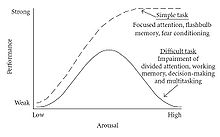Whether you suffer from anxiety periodically or consistently, it boils down to the same thing: fear. That is, anxiety comes from fear, and that fear is a reaction to a perception of a loss of control, whether anticipated or actually occurring. Pick any situation, and explore it. You will find the same thing at the core. For example, anxiety about speaking in public comes from fear of embarrassing oneself or under-performing in some way. Anxiety is also known as worry. Worry about your child driving to the mall to meet friends comes from fear that something bad may happen to your child. (With the way some teenagers drive these days, this might be realistic!)
Anxiety isn’t all bad all the time. Think of anxiety as related to performance. The bell curve that is formed from this relationship is actually known as the Yerkes-Dodson Law. On the X-axis is anxiety or arousal, and on the Y-axis is performance. On the left side, where anxiety is incredibly low, a person may not be primed to do a good job. In the middle, anxiety is at a level that is conducive to the best performance. This represents getting psyched up. On the right side, where anxiety peaks, performance declines. This is the point at which performers choke or get psyched out. Here’s a picture taken from Wikipedia to give you a basic idea of how this plays out.
Rarely do people come into my office with complaints of not having enough anxiety…in fact, that’s never happened! People do sometimes come into my office complaining of a moderate level of anxiety in certain situations. Public speaking is a common one. While some people are crippled by anxiety related to public speaking, most people experience a normal, useful level of anxiety in situations such as this. Once this response is normalized, I find that people feel much better and actually perform slightly better. I guess knowing that there’s nothing weird, strange, crazy or abnormal about you goes along way! The sixty-four dollar question, though, is what to do with high anxiety that mitigates good performance, whether that’s simply making it through the evening when your teenager is out with friends, overcoming angst to get out of bed in the morning and face your workday or getting through a busy grocery store without a panic attack.
One of the best forms of treatment for anxiety is Cognitive Behavioral Therapy or CBT. Basically, this form of therapy intervenes at the cognitive or intellectual level in order to impact behavior. It is based on the idea that our cognitions (thoughts) determine our behavior. In the case of anxiety and other disorders, the idea is to work to take away negative cognitions that keep us from performing at an optimal level at whatever task we need to perform. For example, I frequently hear people talk about feeling anxious when their pastor asks them to turn around and shake a few hands, say good morning to those around them. When it doesn’t have to do with a germ phobia, it seems that the negative thought at work in these situations has to do with a fear of being rejected. The best way to counter this involves tackling this idea and creating a more positive and realistic perception, and the best way to do that is through affirming self-talk. For example, I advise these folks to tell themselves things like: everyone’s in the same boat here and likely feeling some degree of anxiety, the activity is helping me practice my social and interpersonal skills and what’s the worst thing that could happen? That last one is a favorite of mine that I frequently use to help people learn to combat negative thoughts in any circumstance.
Another way to combat negative thoughts is to break them down, look at the reality behind what you’re thinking. For example, say your boss scowls at you as she walks down the hall. You automatically assume that you’ve done something wrong, which turns into thinking that you’re in trouble and then into thinking you’re going to lose your job. That will get you in a panic really quickly–especially in this economy! I would advise you to look at the evidence for and against your thought process. If you know you’ve done nothing inappropriate, remind yourself of this. There really isn’t any reason to believe that you’ll be fired. A more realistic response may be to tell yourself that maybe she’s having a bad day, maybe she’s on her way to someone else’s office to fire him for doing something inappropriate or maybe she’s one of those people who doesn’t even realize her facial expressions.
The bottom line is this: anxiety, as arousal to stimulate performance, can be productive in reasonable amounts. When it goes into overdrive, though, you want to get yourself out of the thought process behind it as quickly as possible. Of course, the Bible has the best self-talk around. For instance, Matthew 6:26 reminds us how valuable we are to God and how he has everything–including us and our lives–under his control: “Look at the birds of the air; they do not sow or reap or store away in barns, and yet your heavenly Father feeds them. Are you not much more valuable than they?” If that doesn’t do it for you, verse 27 reminds us that it doesn’t do any good to worry anyway: “Can any one of you by worrying add a single hour to your life?” When all else fails, verse 34 reminds us that we don’t really have time to worry about the future: “Therefore do not worry about tomorrow, for tomorrow will worry about itself. Each day has enough trouble of its own.” Now that’s my kind of therapy!


